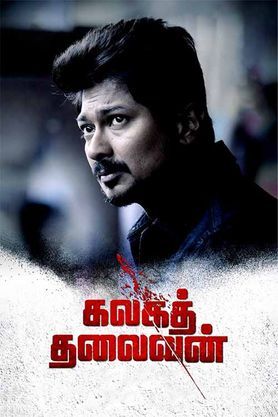
With 'Kalaga Thalaivan', Udhayanidhi hits the right political note
The screenplay, about how selling PSUs hits the lives of the masses, has many opportunities for loud, politically peppered punch dialogues and daring action sequences; it steers clear of them

Come November 27, Udhayanidhi Stalin, the general secretary of the DMK Youth Wing and Chepauk-Triplicane constituency MLA, will celebrate his 45th birthday. It’s been a decade for him as an actor and, over the years, he has shown maturity in choosing scripts that suit his age, body language and, of course, the political ideology he is a descendent of.
His debut film Oru Kal Oru Kannadi (2012) was a romcom, and the one released earlier this year, Nenjukku Needhi, was the remake of Bollywood film Article 15. In all the 13 films that he has acted in so far, Udhay never spoke about his politics. Though in Nenjukku Needhi he touched on the caste issue, it again didn’t take off as his political film.
Also read: Udhayanidhi on quitting acting, working with Kamal, and dad Stalin’s film choices
In that sense, his recently released film Kalaga Thalaivan stands out. Released on November 18, the film talks about how shutting down and selling public enterprises results in leaving ordinary citizens in the lurch, either directly or indirectly. This knot in the screenplay is a reflection of the objections raised by opposition parties to the Union government disinvesting public sector enterprises.
Markets, multinationals, whistleblowers
Revenge is the theme of this no-nonsense action thriller. But it’s the treatment of the screenplay by director Magizh Thirumeni, who is known for his logical and near-to-reality scripts, that takes the audience on an engaging ride.
The story revolves around a multinational company called Vajhra. Headquartered in Faridabad, this heavy vehicle manufacturing company is in the process of launching a new heavy vehicle which can reduce fuel consumption more effectively than products already in the market.
Following a press meet about the launch, the company’s share prices go soaring. However, an information that is kept under wraps is that the new vehicle would emit more pollution than any existing heavy vehicle.
Also read: Kantara makers vs Thaikuddam Bridge: Kerala band to file another case
This secret is shared by an employee of that company to a group of people, who in turn sell it to its competitors for money. To investigate the information theft, the company hires an agency headed by a former Army commando. How the paths of whistleblower and the investigator cross forms the rest of the plot.
Playing within the limits of logic
Udhayanidhi plays a financial analyst, Thirumaran. With metered dialogues and a toned physique — as the character practises the martial art form Wing Chun — he portrays a calm and composed persona. His romantic interest Mythili (played by Nidhhi Agerwal), a medico who practises in a rural area, is just a filler in the movie. Instead of adding value, the love portions slow down the narration.

The show stealer though is 2017 Bigg Boss Tamil title winner Arav. Playing the deadly pathological killer Arjun, who is expelled from the Army, he carries the story literally on his shoulders.
The screenplay has many opportunities for loud, politically peppered punch dialogues and daring action sequences. However, the film steers clear of them. It has only one fight scene and that too in the climax, but it keeps the tempo that is necessary for an action thriller all the way. In one of the flashback scenes, a character advises the young hero that if there are two persons, one can fight and if there are four persons, it is better to run.
Also read | Vikram effect: Kamal Haasan open to work with new-age directors
Tamil people in one way or other are indebted to film stars like MGR, Kamal Haasan, Rajinikanth, Vijay, Vikram and Dhanush for introducing martial art forms such as maan kombu, varma, kalaripayattu, kung fu, kick-boxing, tai chi and adimurai. For his part, Magizh Thirumeni has introduced Wing Chun and connected it with actor Bruce Lee’s popular quote, “I fear not the man who has practised 10,000 kicks once, but I fear the man who has practised one kick 10,000 times.” This perfectly fits Thirumaran’s character.
When personal loss becomes primary
Noted economist J Jeyaranjan was roped in during the discussion of the script in order to check and weed out any factual errors and logical gaps about share markets, corporate funding, etc.
A voiceover explains how ordinary people get directly or indirectly affected when a public enterprise is shut down or privatised — the effect is not merely unemployment but much more, it says.
When the audience gets a hint of why the lead character is locking horns with a giant, and realises that personal revenge has taken over a public cause, the reliability that kept building on the lead character till the final moment starts to fall like a house of cards. It then becomes an ordinary drama. Yet, the film has its moments, and is a first-of-its-kind tribute to whistleblowers who lost their life in a struggle against all forms of corruption.

